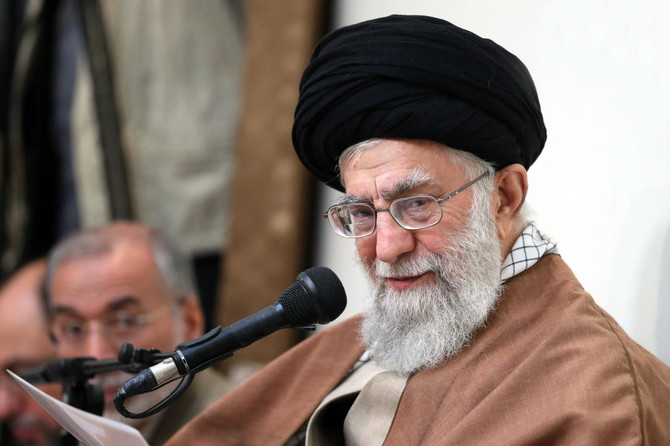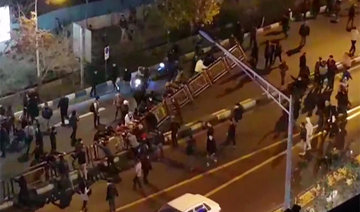LONDON: Iran’s Supreme Leader on Tuesday accused enemies of the Islamic Republic of stirring unrest across the country as a crackdown intensified against anti-government demonstrations that began last week.
Police have arrested more than 450 protesters in the capital Tehran over the past three days, the deputy provincial governor said. Protesters also attacked police stations elsewhere in Iran late into the night on Monday, news agency and social media reports said.
One member of the security forces was reported killed on Monday, bringing to at least 14 the death toll stemming from the boldest challenge to Iran’s clerical leadership since unrest in 2009.
In his first reaction to the unrest, Ayatollah Ali Khamenei said: “In recent days, enemies of Iran used different tools including cash, weapons, politics and intelligence apparatus to create troubles for the Islamic Republic.”
Khamenei said on his website that he would address the nation about the recent events “when the time is right.”
He did not mention any enemies by name but Ali Shamkhani, secretary of the Supreme National Security Council, said the United States, Britain and Saudi Arabia were behind the recent riots in Iran.
“Saudis will receive Iran’s unexpected response and they know how serious it can be,” Shamkhani was quoted as saying by Tasnim news in an interview with Beirut-based Al Mayadeen TV.
Harsh punishment
Musa Ghazanfarabadi, head of Tehran’s Revolutionary Court, warned protesters on Tuesday that those arrested would face harsh punishment.
The semi-official ILNA news agency quoted Ali Asghar Naserbakht, the deputy governor of Tehran province, as saying that 200 people were arrested on Saturday in Tehran, 150 people on Sunday and about 100 people on Monday.
Hundreds of others have been arrested in other cities, according to agency reports and social media.
Naserbakht said the situation in Tehran was under control and police has not asked for the help of the Revolutionary Guards special forces.
Deputy Interior Minister Hossein Zolfaghari said 90 percent of the detainees were under 25-years-old, showing frustration among youths from the economic situation and lack of social freedoms.
Mehr news agency quoted a judiciary official as saying that several ringleaders of protests in Karaj, the fourth largest city in Iran, have been arrested.
Ghazanfarabadi said the detainees will be soon put on trial and the ringleaders would face serious charges including “moharebeh” — an Islamic term meaning warring against God — which carries the death penalty.
Iran’s judiciary chief Sadeq Larijani ordered prosecutors on Monday to “punish rioters firmly.”
The demonstrations which broke out last week were initially focused on economic hardships and alleged corruption but turned into political rallies.
Anger was soon directed at the clerical leadership that has been in power since the 1979 revolution, including Supreme Leader Ayatollah Ali Khamenei, the ultimate authority in Iran’s system of dual clerical and republican rule.
Iran is a major OPEC oil producer and regional power deeply involved in Syria and Iraq as part of a battle for influence with rival Saudi Arabia.
Many Iranians resent the foreign interventions and want their leaders to create jobs at home, where youth unemployment reached 29 percent last year.
Government spokesman Mohammad Baqer Nobakht said in a news conference that both protesters and the security forces should follow the law.
“People have the rights to protest but there is a difference between demonstration and riot...Even those who are confronting the rioters should act within the framework of law,” he said.
Videos on social media on Monday showed an intense clash in the central town of Qahderijan between security forces and protesters who were trying to occupy a police station, which was partially set ablaze.
There were unconfirmed reports of several casualties among demonstrators.
In the western city of Kermanshah, protesters set fire to a traffic police post, but no one was hurt in the incident, Mehr news agency said.
State television reported that protesters burned down four mosques in villages in Savadkuh County in northern Iran on Monday.
Reactions
Rouhani refrained on Monday from accepting responsibility of problems raised by protesters and he blamed his predecessor and also Iran’s long-time adversary, the United States for the government’s shortcomings.
Rouhani, seen as a pragmatist who is at odds with hard-liners, said: “People on the streets do not ask for bread and water, but for more freedom,” — implying that the protesters were not targetting his government but the more rigid establishment.
US President Donald Trump supported the protesters in a tweet on Monday: “The great Iranian people have been repressed for many years. They are hungry for food & for freedom. Along with human rights, the wealth of Iran is being looted. TIME FOR CHANGE!“
Turkey said on Tuesday it was concerned by reports of people dying and public buildings being damaged in Iran.
“We believe it is necessary to avoid violence and not succumb to provocations,” the Turkish Foreign Ministry said in a statement, adding that it hoped foreign intervention would be avoided.
The Russian Foreign Ministry was quoted by the RIA news agency as saying external interference was destabilising the situation and calling it “unacceptable.”
Iran and Russia are the main allies of Syrian President Bashar Assad, while the United States, Saudi Arabia and Turkey support rebel groups. (Additional reporting by Vladimir Soldatkin in Moscow and Tulay Karadeniz in Ankara, Editing by Angus MacSwan)


























